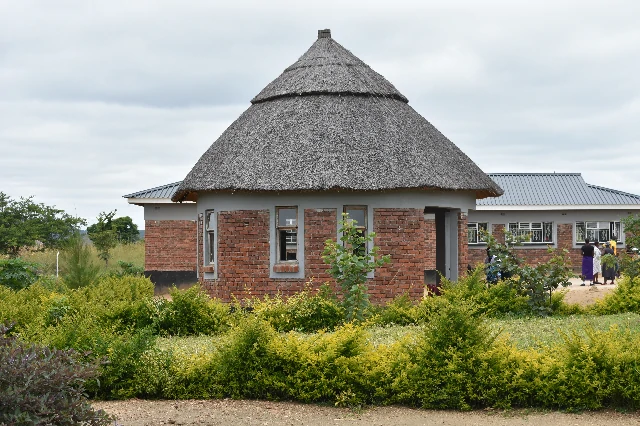Despite the existence of legally binding national, regional and international frameworks and conventions aimed to promote girls and women’s empowerment, girls continue to face discrimination and violence which derails them from realising their full potential.
Due to the remote locations, children living in rural communities often miss out on access to safe spaces and essential services. Whilst schools serve as safe spaces for children to disclose challenges of sexual gender based violence, there is a greater risk for children who are out of school.
In 2017, Rozaria Memorial Trust (RMT) initiated the modern Nhanga in its programming work as a cultural innovation for promoting girls empowerment. Nhanga is a feminist and intergenerational space for advocacy, leadership, mentorship and skills building. In the Shona culture, Nhanga is a name of the room where girls sleep. Nhanga is a room, traditionally used as a space for grooming the girl child in preparation for marriage including advise from the elderly on how to sexually please and care for her husband.

For the past 5 years, Rozaria Memorial Trust has been convening the Nhanga at community, national, regional and global policy influencing platforms such as the African Union Girls’ Summit, SADC People’s Summit, Gender Is My Agenda (GIMAC) and the Commission on the Status of Women (CSW) in New York. In 2020, Rozaria Memorial Trust invested in the documentation of the Nhanga in Zimbabwe, Malawi, Zambia, Mozambique and Eswatini to develop tools for systematic use of the Nhanga by the organisation including for replication by partners.
The regional research was conducted with the financial support from Plan International, HIVOS, Amplify Change, SRHR Africa Trust and IM Swedish Development Partner through the technical support from Social Impact 360 and REJ Consultants. Nhanga is a common concept, in Malawi it is known as Chinamwali although the convening of safe spaces differ based on culture and beliefs, the study notes.
In Malawi, Senior Chief Chikumbu from Mulanje who is highly involved in the convening of the Chinamwali as the custodian of culture remarked to the research team on the need to promote positive cultural practices.
“I observed that most girls were being taught as if they were preparing them for marriage the next day, I took it upon myself and organised a committee of women and my Chiefs to ensure children were not exposed to such information and should only attend when they begin their menstruation to learn about their bodies and how best they can take care of themselves,” said Chief Chikumbu.
Whilst the traditional models of the Nhanga and Chinamwali mostly focus on preparing the girl child for marriage, traditional leaders like Chief Chikumbu, Chief Mangwende of Murewa, Chief Bushu and Chief Nyamaropa of Shamva are challenging harmful traditional practices in their chiefdoms. Chief Mangwende, Chief Bushu and Chief Nyamaropa developed bylaws on ending child marriage in their chiefdoms through technical support from Rozaria Memorial Trust.
Chief Bushu and Chief Nyamaropa have acknowledged the modern Nhanga innovation in the Bylaws for Shamva, adopting a firm stance for a community Nhanga that promotes intergenerational dialogue and dissemination of age appropriate content in the Nhanga. Section 6.12 of the Chiefs’ bylaws states:
“In the Chiefdoms there shall be a community Nhanga. The purpose of the Nhanga will be to provide a platform for intergenerational dialogue, counselling and cordial relations with the chieftaincy. The Nhanga shall be attended by young women and girls. The chief’s wife is encouraged to be amongst the mentors”.
In Murewa, Chief Mangwende’s bylaws promote the modern Nhanga and calls for the establishment of safe spaces that empower girls and boys. Section 8.1 of By-laws by Chief Mangwende states that:
“All people with responsibility of raising a child must promote culturally-sensitive and age appropriate sexual and reproductive health of boys and girls including through cultural safe spaces such as Nhanga, Gota or Dare”.
Sharing on the Nhanga methodology, the Gender Justice Officer for Rozaria Memorial Trust, Ms Ruwadzano Muzvondiwa said the documentation of the Nhanga was essential in promoting positive culture through the traditional leadership as custodians of culture.
“Positive culture can be used to protect women and girls from all forms of abuse; this has been evidenced by the institutionalisation of the Nhanga by the traditional leadership in Murewa and Shamva communities. The Theory of Change and Nhanga tools are critical in ensuring the replication of the model by traditional leaders in rural communities,” said Muzvondiwa.
Samantha Chidodo, an RMT girls’ rights advocate is taking initiative to convene Nhanga in remote and hard to reach communities in a bid to stop child marriages and violence against women.
“As a young woman, who has received mentorship through Rozaria Memorial Trust, I was motivated to start Nhanga in remote rural communities. Economic empowerment is important because girls in my community are often lured since their families fail to provide for their needs due to poverty. There is a lot of gold panning activities where I live and cases of child marriage, rape and gender based violence are prevalent. Our Nhanga is business oriented, we buy and sell goods to provide for our needs as well as sanitary wear for girls who live in extreme poverty,” said Chidodo.
The Nhanga innovation and safe space is essential in taping positive cultural practices that empowers girls and promotes intergenerational leadership.
